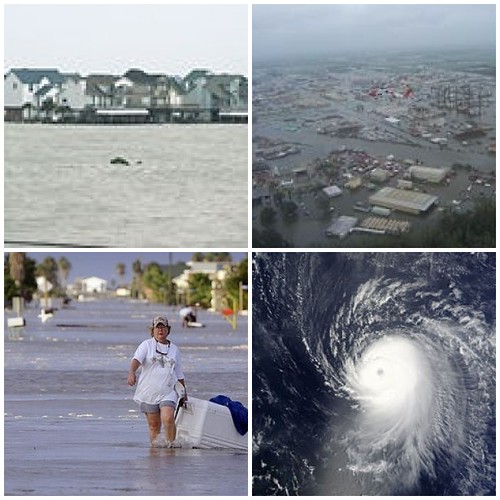Hurricane Ike was the ninth named storm, and fifth hurricane of the 2008 Atlantic hurricane season.[1] It was a Cape Verde-type hurricane, as it started as a tropical disturbance off the coast of Africa near the end of August, then tracked south of Cape Verde and slowly developed. On September 1, it became a tropical storm west of the Cape Verde islands.[2][3]
By the early morning hours of September 4, Ike was a Category 4 hurricane, hitting its peak with 145 mph (233 km/h) winds and a pressure of 935 mbar (27.61 inHg).[4] That made it the most intense storm so far in the 2008 Atlantic hurricane season. At one point the diameter of Ike's tropical storm and hurricane force winds were 450 and 190 miles (720 and 305 km), respectively. Ike has been blamed for 145 deaths, primarily in Haiti, which was already trying to recover after the impact of three prior 2008 systems, Fay, Gustav, and Hanna, and in the United States, with many of the deaths taking place well inland. Damages from Ike in US coastal areas are estimated at $27 billion (2008 USD), with additional damage of up to $4 billion in Cuba.[5] If the estimates are accurate, Ike will be the third or fourth costliest Atlantic hurricane and third costliest U.S. hurricane of all time
Formed September 1, 2008
Dissipated September 14, 2008
Highest
winds 145 mph (230 km/h) (1-minute sustained)
Lowest pressure 935 mbar (hPa; 27.62 inHg)
Fatalities 145 direct, 37 indirect, 400 missing
Damage $29.5 billion (2008 USD)
(estimated)
Areas
affected Turks and Caicos, Bahamas, Haiti, Dominican Republic, Cuba, Florida Keys, Mississippi, Louisiana, Texas, Mississippi Valley, Ohio Valley
Part of the
2008 Atlantic hurricane season
“A lot of people felt it was a false alarm,” he said. “I think they're realizing this is not a false alarm.”
While more than 2 million people evacuated ahead of Ike, tens of thousands more ignored evacuation orders and swamped rescue crews Saturday with emergency calls from the flooded lowlands of East Texas and western Louisiana.
“Of course it's frustrating. There was a mandatory evacuation, and people didn't leave,” said Steve LeBlanc, Galveston's city manager. “They had enough time to get out. It's just unfortunate that they decided to stay.”
Thursday, September 18, 2008
Hurricane Ike
Subscribe to:
Post Comments (Atom)










No comments:
Post a Comment